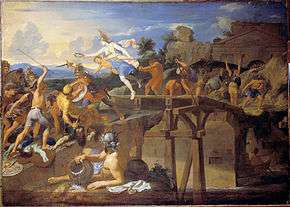Horatia (gens)

The gens Horatia was an ancient patrician family at Rome. In legend, the gens dates back to the time of Tullus Hostilius, the third King of Rome. One of its members, Marcus Horatius Pulvillus, was consul suffectus in 509 BC, the first year of the Republic, and again in 507. But the most famous of the Horatii was certainly his nephew, Publius Horatius Cocles, who held the Sublician bridge against the army of Lars Porsena circa 508 BC.[1]
Origin
The nomen Horatius is said to have been derived from the hero Horatus, to whom an oak wood was dedicated. The gens was certainly of Latin origin, although there was some uncertainty as to when they arrived at Rome. A legend relates that in the reign of Tullus Hostilius, the fate of the ancient city of Alba Longa was decided by combat between three brothers from that city and three from Rome. The historian Livy states that most sources assigned the Horatii to Rome, and their opponents, the Curiatii, to Alba Longa. The victory of the Horatii was a pretext for the destruction of Alba Longa, and the transfer of its noble families to Rome.[2][3]
Praenomina
The Horatii favored the praenomina Publius, Marcus, Lucius, and Gaius.[1]
Branches and cognomina
The Horatii of the Republic bore the surnames Barbatus, Cocles, and Pulvillus. Of these, Barbatus and Pulvillus were family names, while Cocles appears to have been a personal cognomen, given to the hero of the Sublician bridge. Plutarchus supposes that it was derived from the Greek cyclops, because he had lost an eye, or because the shape of his face made it appear as if he had but one eye. Cocles is said to have been the nephew of Marcus Horatius Pulvillus, and if he left any issue, they do not seem to have carried on his surname. Other surnames appearing amongst the Horatii in later times may have been adopted by freedmen of the gens; the poet Quintus Horatius Flaccus was the son of a libertinus, and the cognomen Flaccus is not otherwise found amongst the Horatii.[4][1]
Members
- This list includes abbreviated praenomina. For an explanation of this practice, see filiation.
- Publius Horatius, father of the Horatii who fought against the Curiatii, absolved his son of guilt in the death of his sister. In some versions of the story, his praenomen is Marcus.[5][6][7][8]
- Publius Horatius, one of the Horatii, three brothers who fought against the three Curiatii in the reign of Tullus Hostilius; and the sole survivor of the combat.
- Horatia, sister of the Horatii, was betrothed to one of the Curiatii, and because of her display of grief was slain by her victorious brother. An ancient tomb near the Porta Capena was said to have been hers.[9][10][11]
- Publius Horatius Cocles, one of the heroes of the Republic, defended the Sublician bridge against the army of Lars Porsena, circa 508 BC.[12][13][14][15][16][17][18]
- Quintus Horatius Flaccus, a poet during the time of Augustus.
Horatii Pulvilli
- Marcus Horatius Pulvillus, father of the consul of 509, and according to legend, grandfather of Publius Horatius Cocles.
- Marcus Horatius M. f. Pulvillus, consul suffectus in 509 BC, the first year of the Republic; he was consul again in 507.
- Gaius Horatius M. f. M. n. Pulvillus, consul in 477 and 457 BC; he defeated the Aequi.
- Lucius Horatius Pulvillus, tribunus militum consulari potestate in 386 BC.[19]
- Marcus Horatius Pulvillus, tribunus militum consulari potestate in 378 BC.[20]
Horatii Barbati
- Marcus Horatius M. f. L. n. Barbatus, with Lucius Valerius Potitus, helped to abolish the decemvirate in 449 BC; the two elected consuls for the same year; Horatius triumphed over the Sabines.
- Lucius Horatius M. f. M. n. Barbatus, tribunus militum consulari potestate in 425 BC.[21][22]
See also
Footnotes
- 1 2 3 Dictionary of Greek and Roman Biography and Mythology, William Smith, Editor.
- ↑ Livy, Ab Urbe Condita, i. 24-26.
- ↑ Dionysius of Halicarnassus, Romaike Archaiologia, iii. 12-22, 28-32; v. 14.
- ↑ Plutarch, Lives of the Noble Greeks and Romans, "Poplicola" 16.
- ↑ Livy, 1.26.
- ↑ Joannes Zonaras, Epitome Historiarum, vii. 6.
- ↑ Dionysius of Halicarnassus, Romaike Archaiologia, iii. 28-32.
- ↑ Cicero, Pro Milone, 3.
- ↑ Dionysius of Halicarnassus, Romaike Archaiologia, iii. 21.
- ↑ Livy, i. 26.
- ↑ Florus, Epitome de T. Livio Bellorum Omnium Annorum DCC libri duo, i. 3.
- ↑ Livy, i. 10.
- ↑ Dionysius of Halicarnassus, Romaike Archaiologia, v. 24, 25.
- ↑ Valerius Maximus, Factorum ac Dictorum Memorabilium libri IX, iii. 2. § 1.
- ↑ Florus, Epitome de T. Livio Bellorum Omnium Annorum DCC libri duo, i. 10.
- ↑ Sextus Aurelius Victor, De Viris Illustribus, 11.
- ↑ Plutarch, Lives of the Noble Greeks and Romans, "Poplicola", 16.
- ↑ Seneca the Younger, Epistulae Morales ad Lucilium, 120 ff.
- ↑ Livy, vi. 6.
- ↑ Livy, vi. 31.
- ↑ Livy, vi. 35.
- ↑ T. Robert S. Broughton, The Magistrates of the Roman Republic (1952).
![]()